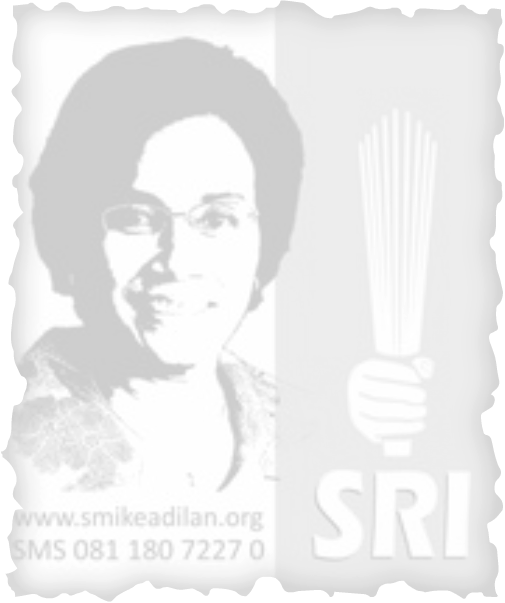In the past, during The Graet Depression, when Sukarno was put in jail for agitation against the administration of Dutch East Indies, Hatta and Sutan Syahrir continue [reorganize] National Party. They give a new formulation of the "Party" - namely "Education" - thus giving new dimensions and directions for politics. It's alter characteristics of the Party from mass mobilization into an institution of Education [prepare future leadership]. I find this is the correct attitude and perception for anyone NOW to join a political party, defining current national issues [corruption, unemployment] and to search grounds for provide solution. For 2014, SRI will become the first party founded on that awareness. The presence in election is expected by new generation of voters, namely the present People of Indonesia. Hopefully! Thx.
Sjahrir knows what he wants and will not be distracted by popular
sentiment or circumstantiality. He is able to overturn a ministry
fabricated by the Japanese and establish a new ministry of honest,
fairly capable, fairly democratic and social minded men under his
leadership. No small feat in revolutionary circumstances [Wertheim]
In 1929 he studied law at Amsterdam University and Leiden University in the Netherlands and gained an appreciation for socialist principles. Sjahrir was a part of several labor unions as he worked to support himself. He was briefly the secretary of the Indonesian Association (Perhimpunan Indonesia), an organization of Indonesian students in the Netherlands. Sjahrir was also one of the co-founders of Jong Indonesie, an Indonesian youth association in lieu of the need of an association to assist in the development of Indonesian youth for further generations, only to change within a few years to Pemuda Indonesia. This, in particular, played an important role in the Youth Congress (Sumpah Pemuda), in which the association helped the congress itself to run. During his political activities as a student in the Netherlands he became a close associate of the older independence activist Mohammad Hatta, future vice-president of Indonesia.
When the 'Indonesian Association' (PI) drifted to the far political left, both Hatta and Sjahrir parted with the organisation. In a reaction to the intrigue by communist cells in the PI against Hatta and himself Sjahrir stayed calm and in character. In his memoirs their Dutch associate Sol Tas recalls: "He was not intimidated for one minute by official or quasi-official declarations, by communiques or other formulae, not afraid for one second of the maneuvers directed against him, and still less concerned for his reputation. That mixture of self-confidence and realism, that courage based on the absence of any ambition or vanity, marked the man."
At the height of chaos and violence during the early Bersiap period of the Indonesian revolution Sjahrir published an epoch-making pamphlet named 'Our Struggle'."Perhaps the high point of his career was the publication of his pamphlet 'Our Struggle'. Whoever reads that pamphlet today can scarcely comprehend what it demanded in insight and courage. For it appeared at a moment when the Indonesian masses, brought to the boiling point by the Japanese occupation and civil war, sought release in racist and other hysterical outbursts. Sjahrir's pamphlet went directly against this, and many must have felt his call for chivalry, for the understanding of other ethnic groups, as a personal attack." Sol Tas.
After writing his pamphlet he was appointed Prime Minister by President Sukarno in November 1945 and served until June 1947. Professor Wertheim describes Sjahrir's early accomplishments as Prime minister as follows: "...Sjahrir knows what he wants and will not be distracted by popular sentiment or circumstantiality. He is able to overturn a ministry fabricated by the Japanese and establish a new ministry of honest, fairly capable, fairly democratic and social minded men under his leadership. No small feat in revolutionary circumstances..."
Due to his non-cooperative stance during the Japanese occupation he was one of the few Republican leaders acceptable to the Dutch government during the early independence negotiations. In 1946 Sjahrir played a crucial role in negotiating the Linggadjati Agreement. Because his thoughts were ahead of his time he was often misunderstood and started to acquire internal political adversaries.
“A national revolution is only the result of a democratic revolution, and nationalism should be second to democracy. The State of Indonesia is only a name we give to the essence we intend and aim for.” In 'Perdjoeangan Kita' (Our Struggle), October 1945, Sjahrir.
After writing his pamphlet he was appointed Prime Minister by President Sukarno in November 1945 and served until June 1947. Professor Wertheim describes Sjahrir's early accomplishments as Prime minister as follows: "...Sjahrir knows what he wants and will not be distracted by popular sentiment or circumstantiality. He is able to overturn a ministry fabricated by the Japanese and establish a new ministry of honest, fairly capable, fairly democratic and social minded men under his leadership. No small feat in revolutionary circumstances..."
Due to his non-cooperative stance during the Japanese occupation he was one of the few Republican leaders acceptable to the Dutch government during the early independence negotiations. In 1946 Sjahrir played a crucial role in negotiating the Linggadjati Agreement. Because his thoughts were ahead of his time he was often misunderstood and started to acquire internal political adversaries.
“A national revolution is only the result of a democratic revolution, and nationalism should be second to democracy. The State of Indonesia is only a name we give to the essence we intend and aim for.” In 'Perdjoeangan Kita' (Our Struggle), October 1945, Sjahrir.



